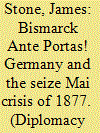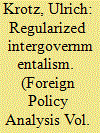| Srl | Item |
| 1 |
ID:
112169


|
|
|
| 2 |
ID:
114165


|
|
|
|
|
| Publication |
2012.
|
| Summary/Abstract |
The seize mai crisis of 1877 was the occasion for last of the three war scares that punctuated Franco-German relations in the 1870s. However, it has not been given the detailed scrutiny it deserves. It was not only important for the amount of influence that Bismarck exerted during a six month period to influence the course of French domestic politics at a critical juncture. This crisis also provides a cipher for understanding the earlier crises of 1873-1874 and 1875 since the German Chancellor pursued his key objective of supporting the establishment of a republic much more openly in 1877 and his tactics are much better documented than in the earlier scares. A closer look at the events of 1877 reveals more continuity in both the means and ends used by Bismarck in his dealings with France during the mid-1870s than was previously thought.
|
|
|
|
|
|
|
|
|
|
|
|
|
|
|
|
| 3 |
ID:
101840


|
|
|
|
|
| Publication |
2011.
|
| Summary/Abstract |
The role of international friendship in regional integration - be it as one of encouraging integration or as its by-product - tends to be overshadowed by (realist) assumptions of naked self-interest. This article aims to open up a space for friendship in the study of regional integration, by exploring the structuration of a series of speech acts and institutional facts that can be interpreted as signs of engagement in, and proofs of, friendship. In doing this, it puts forward a new analytical perspective and methodological framework. The case studies chosen to illustrate the analysis - the Franco-German and the Argentine-Brazilian dyads - reflect the historical meaning of the experience of moving away from enmity/antagonism towards building relationships based on mutual trust, which put these dyads at the centre of regional integration processes.
|
|
|
|
|
|
|
|
|
|
|
|
|
|
|
|
| 4 |
ID:
095599


|
|
|
|
|
| Publication |
2010.
|
| Summary/Abstract |
Regularized intergovernmentalism refers to a distinct kind of foreign policy practice that connects and intertwines foreign policy processes in particular ways. This paper puts forth a concept to properly capture and expose such distinctive foreign policy realities characterizing certain periods and places. With this concept, the article systematically scrutinizes the intergovernmental fabric of bilateral Franco-German relations from 1963 to 2009. The characteristic features of Franco-German regularized intergovernmentalism represent a crucial foreign policy connection, foundational for European affairs of the past half century and a defining feature of Europe's post-war order and regional governance. Exploring key aspects of what it is that links France and Germany in particular ways, this paper offers a historically deeply grounded constitutive analysis. Based on its constitutive inquiries, the papers points at new possibilities of causal theorizing and explores some of regularized intergovernmentalism's hypothesized effects and limitations. Franco-German intergovernmental affairs may be the most developed instance of this practice. But regularized bilateral intergovernmentalism is not a Franco-German idiosyncrasy. Rather, it is an important and apparently growing approach to structuring foreign policy conduct, and seems an increasingly prominent aspect of how the world is organized.
|
|
|
|
|
|
|
|
|
|
|
|
|
|
|
|
| 5 |
ID:
123694


|
|
|
|
|
| Publication |
2013.
|
| Summary/Abstract |
AbstractIn this article we argue that trust is fundamental to post-agreement negotiations in the field of international security. We present our concept of interstate trust and discuss its relation to two core mechanisms of international cooperation: control and policy integration. Our main hypothesis is that growing trust reduces a dyad's reliance on control and leads to intensified policy integration. To specify how the trust-control nexus and the trust-integration nexus structure post-agreement negotiations, we first assume that post-agreement negotiations are likely to follow interstate crises. Second, we theorize crisis reactions and differentiate between low-trust and high-trust situations. In low-trust situations, a crisis indicates a failure to control the actions of others. As a response, demands for institutional reform will stress new and improved control mechanisms. In high-trust situations, the trusting bias defuses most of the doubts about the other's cooperative preferences and points to miscommunication as the principal issue. Therefore, negotiations will be about intensifying policy integration. States do so for three purposes: sustaining valuable integration, overcoming the crisis, and building trust. As a first plausibility probe for our argument, we look at post-agreement negotiations between France and Germany.
|
|
|
|
|
|
|
|
|
|
|
|
|
|
|
|